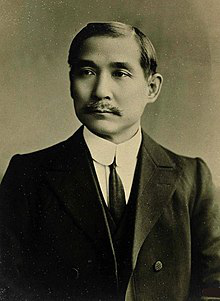

Provisional President of the Republic of China
Sun Deming 12 November 1866 Cuiheng, Guangdong, Qing dynasty
12 March 1925(1925-03-12) (58) Beijing, Republic of China
1 January 1912 – 10 March 1912
"Sun Wen" redirects here. For the female Chinese footballer, see Sun Wen (footballer). Chinese statesman, physician, and revolutionary Sun Yat-sen孫中山 / 孫逸仙 / 孫文 ... and other names Sun Yat-Sen in 1911Provisional President of the Republic of ChinaIn office 1 January 1912 – 10 March 1912Vice President Li YuanhongPreceded by Puyi (Emperor of China)Succeeded by Yuan ShikaiPremier of the KuomintangIn office 10 October 1919 – 12 March 1925Preceded by Position establishedSucceeded by Zhang Renjie (as chairman) Personal detailsBornSun Deming (孫德明 ) (1866-11-12 ) 12 November 1866 Cuiheng, Guangdong, Qing dynastyDied12 March 1925(1925-03-12) (aged 58) Beijing, Republic of ChinaResting placeSun Yat-sen Mausoleum, Nanjing, Jiangsu, People's Republic of ChinaPolitical partyKuomintangOther political affiliationsChinese Revolutionary PartySpouse(s)Lu Muzhen (m. 1885; div. 1915) Kaoru Otsuki (m. 1903–1906) Soong Ching-ling (m. 1915–1925)Domestic partnerChen Cuifen (concubine) (1892–1925) Haru Asada (concubine) (1897–1902) ChildrenSun Fo Sun Yan Sun Wan Fumiko MiyagawaMotherMadame YangFatherSun DachengAlma materHong Kong College of Medicine for Chinese (MD), Queen's College, Hong KongOccupationPhilosopher, physician, politicianAwardsGrand Merit Order (Awarded by President Yuan Shikai but declined by Sun himself)Signature (Chinese)SignatureMilitary serviceAllegiance Republic of ChinaBranch/service Republic of China ArmyYears of service1917–1925RankGrand MarshalBattles/wars Xinhai Revolution Second Revolution Constitutional Protection Movement Guangdong-Guangxi War Warlord Era Chinese nameTraditional Chinese孫逸仙 Simplified Chinese孙逸仙 TranscriptionsStandard MandarinHanyu PinyinSūn Yìxiān Gwoyeu RomatzyhSuen Yihshian Wade–GilesSun1 I4-hsien1 IPA Yue: CantoneseYale RomanizationSyūn Yaht-sīn JyutpingSyun1 Jat6-sin1 IPA Southern MinHokkien POJSun E̍k-sian Sun ZhongshanTraditional Chinese孫中山 Simplified Chinese孙中山 TranscriptionsStandard MandarinHanyu PinyinSūn Zhōngshān Gwoyeu RomatzyhSuen Jongshan Wade–GilesSun1 Chung1-shan1 IPA Yue: CantoneseYale RomanizationSyūn Jūng sāan JyutpingSyun1 Zung1 saan1 Southern MinHokkien POJSun Tiong-san Zaizhi (courtesy name) Chinese載之 TranscriptionsStandard MandarinHanyu PinyinZài Zhī Yue: CantoneseYale RomanizationJai-jī Sun WenTraditional Chinese孫文 Simplified Chinese孙文 TranscriptionsStandard MandarinHanyu PinyinSūn Wén Yue: CantoneseYale RomanizationSyūn Màhn Sun Yat-sen (/ˈ s ʌ n ˌ j æ t ˈ s ɛ n / ; born Sun Deming; 12 November 1866 – 12 March 1925) was a Chinese statesman, physician, and political philosopher, who served as the provisional first president of the Republic of China and the first leader of the Kuomintang (Nationalist Party of China). He is called the "Father of the Nation" in the Republic of China, and the "Forerunner of the Revolution" in the People's Republic of China for his instrumental role in the overthrow of the Qing dynasty during the Xinhai Revolution. Sun is unique among 20th-century Chinese leaders for being widely revered in both mainland China and Taiwan. Sun is considered to be one of the greatest leaders of modern China, but his political life was one of constant struggle and frequent exile. After the success of the revolution in 1911, he quickly resigned as President of the newly founded Republic of China and relinquished it to Yuan Shikai. He soon went to exile in Japan for safety but returned to found a revolutionary government in the South as a challenge to the warlords who controlled much of the nation. In 1923, he invited representatives of the Communist International to Canton to re-organize his party and formed a brittle alliance with the Chinese Communist Party. He did not live to see his party unify the country under his successor, Chiang Kai-shek, in the Northern Expedition. He died in Beijing of gallbladder cancer on 12 March 1925. Sun's chief legacy is his political philosophy known as the Three Principles of the People: Mínzú (民族主義, Mínzú Zhǔyì) or nationalism (independence from foreign domination), Mínquán (民權主義, Mínquán Zhǔyì) or "rights of the people" (sometimes translated as "democracy"), and Mínshēng (民生主義, Mínshēng Zhǔyì) or people's livelihood (sometimes translated as "communitarianism" or "welfare").

We use cookies
We use cookies and other tracking technologies to improve your browsing experience on our website, to show you personalized content and targeted ads, to analyze our website traffic, and to understand where our visitors are coming from. Privacy Policy.